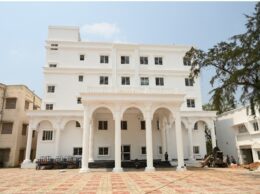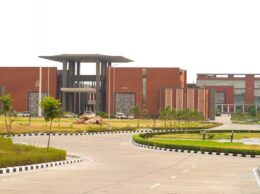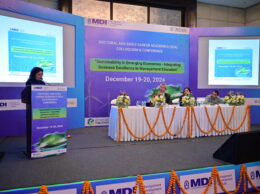Chennai, 14TH June 2019: Indian Institute of Technology Madras’ Avishkar Hyperloop Team today (14th June 2019) unveiled their Hyperloop Pod, which will compete in the global competition being organized by SpaceX, the American aerospace manufacturer and space transportation company.
Avishkar Hyperloop is the student team from Centre For Innovation (CFI) – IIT Madras, working on an indigenous design and development for building the first-ever self-propelled, completely autonomous Hyperloop Pod in India. It is one of the Top 21 teams out of 1600+ teams participating globally and the only Asian team to enter the finals of SpaceX Hyperloop Pod Competition 2019.
The team is working with a vision to develop technologies for future mode of high-speed transportation with applications in various fields including Defence, Logistics and Aerospace Industry, among others.
Speaking about the significance of this achievement, Dr. S.R. Chakravarthy, Faculty Advisor, Avishkar Hyperloop, and Professor, Department of Aerospace Engineering, IIT Madras, said, “The team has taken strenuous technical efforts at every stage, and has been quite professional about executing the project. This is an important milestone for the future transportation technology in our country. “
Hyperloop is the 5th mode of transportation, a high-speed train that travels in a near-vacuum tube. The reduced air resistance allows the capsule inside the tube to reach speeds of more than 1000 km/h. Mr. Elon Musk, Founder of SpaceX, proposed the idea of Hyperloop to the world in 2013 through whitepaper – ‘Hyperloop Alpha.’ His company SpaceX organizes the Hyperloop Pod Competition to accelerate the development of functional prototypes and encourage student innovation.
Select teams build a subscale prototype transport vehicle to demonstrate the technical feasibility of the various aspects of the Hyperloop concept. In this global competition, the final round (testing and evaluation of the actual prototype), takes place at the SpaceX Headquarters in California, U.S. The Fastest Pod wins the Competition.
Speaking about the competition, Mr. Suyash Singh, Student Team Head, Avishkar Hyperloop, said, “The primary factor to decide the winner is the top speed achieved by the Hyperloop Pod in the run in the 1-mile long vacuum tube, installed at the SpaceX headquarters. But, to qualify to the top few teams to be allowed to run through the tube, the design has to go through a lot of checks and scrutiny based on its feasibility, manufacturing possibility and its safety aspects.”
The Pod developed by Avishkaar Team spans about three metres in length and weighs around 120 kgs. The electric propulsion employs BLDC motors and a wheel drive. The team started the design by brainstorming on how the pod would be built, beginning with vehicle kinematics and dynamics, motors, power system and braking, stability, and finally designing the CFRP chassis and structures.
The first step was to select powerful motors that could provide the required traction and a source to power it. The students searched through numerous motors and controllers and a vacuum compatible battery pack, which would best suit the design and constraints. And simultaneously came the challenge of analysing every change in the other subsystems so that it could accommodate the change in speed, mass, forces etc. Avishkaar had to perform a number of iterations and simulations, looking through every available resource that could make their Pod better, keeping in mind the timeline.
They have already been
* Invited to exhibit at FISITA World Automotive Congress 2018 & CII Future Mobility Show 2019,
* Invited to address an International Conference on Energy Storage (ESI) 2019,
* Invited to exhibit Hyperloop technology for Defence purpose at Army Technology Seminar 2019.
Avishkaar will be going ahead with wheel drive for this year’s competition, trying to achieve the highest speed possible. And simultaneously, they are carrying out research on the magnetic levitation and LIM technology. After the competition, they will attempt incorporating the magnetic levitation into the pod and participate in the competition to see how it actually performs alongside others since they expect a lot of teams to develop the levitation pod.
The Students will be working more until they reach a good enough speed for hyperloop, after which they can make changes accordingly for the payload and actual operating situations and start testing on the track which is currently being built. This may take up to some five years or more. Once they reach a level to commercialise the project, the students plan to set up a start-up. Commercialising such a heavy infrastructure project would not be possible without the support of the government and its various agencies. The students plan to discuss these with respective authorities and pave a way forward to develop one of the most futuristic technologies in the world.









